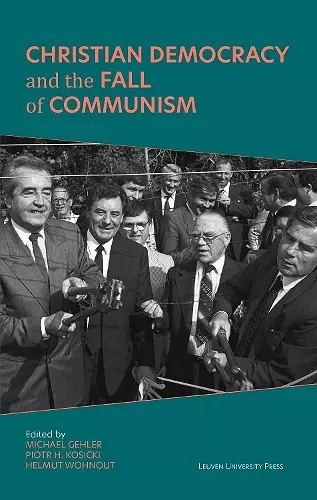Christian Democracy and the Fall of Communism
Helmut Wohnout editor Michael Gehler editor Piotr H Kosicki editor
Format:Hardback
Publisher:Leuven University Press
Published:20th Nov '19
Currently unavailable, and unfortunately no date known when it will be back

The role of Christian Democracy in the collapse of the Communist Bloc
Debates on the role of Christian Democracy in Central and Eastern Europe too often remain strongly tied to national historiographies. With the edited collection the contributing authors aim to reconstruct Christian Democracy’s role in the fall of Communism from a bird's-eye perspective by covering the entire region and by taking “third-way” options in the broader political imaginary of late-Cold War Europe into account. The book’s twelve chapters present the most recent insights on this topic and connect scholarship on the Iron Curtain’s collapse with scholarship on political Catholicism.
Christian Democracy and the Fall of Communism offers the reader a two-fold perspective. The first approach examines the efforts undertaken by Western European actors who wanted to foster or support Christian Democratic initiatives in Central and Eastern Europe. The second approach is devoted to the (re-)emergence of homegrown Christian Democratic formations in the 1980s and 1990s. One of the volume’s seminal contributions lies in its documentation of the decisive role that Christian Democracy played in supporting the political and anti-political forces that engineered the collapse of Communism from within between 1989 and 1991.
Contributors: Andrea Brait (University of Innsbruck), Alexander Brakel (Konrad Adenauer Foundation, Israel), Ladislav Cabada (Metropolitan University Prague), Giovanni Mario Ceci (Università degli Studi Roma Tre / IES-Rome), Kim Christiaens (KU Leuven), Michael Gehler (University of Hildesheim), Thomas Gronier (UMR SIRICE), Piotr H. Kosicki (University of Maryland), Sławomir Łukasiewicz (John Paul II Catholic University of Lublin), Anton Pelinka (Central European University in Budapest), Johannes Schönner (Karl von Vogelsang Institute), Artūras Svarauskas (Lithuanian University of Educational Science), Helmut Wohnout (Austrian Federal Chancellery / Karl von Vogelsang Institute)
This publication is GPRC-labeled (Guaranteed Peer-Reviewed Content).
Christian Democracy and the Fall of Communism provides a thoroughly researched and original contribution to the scholarship on the West-East implications in the context of the 1989 historic milestone in general and in terms of Christian Democracy in particular. Individual contributions to this volume are solidly evidence based, in terms of both primary and secondary sources. Their specific viewpoints implicitly complete each other into a sort of a harmonized whole. The resulting picture documents convincingly the role and implication of Christian Democracy in the fall of communism and beyond as a sort of Pyrrhic victory as to its long-term impact on the fate of Christian Democracy in both parts of Europe. This volume might serve as a cogent and coherent methodological lesson on the applicability of Western European political concepts to Central and Eastern Europe.Miloslav Bednář, H-Diplo, H-Net Reviews. June, 2021
URL:http://www.h-net.org/reviews/showrev.php?id=56446
La solide introduction de Michael Gehler et surtout la passionnante conclusion de Piotr H. Kosicki offrent, elles, de véritables synthèses qui donnent à penser.Yvon Tranvouez, Archives de sciences sociales des religions [En ligne], 192 | octobre-décembre 2020, URL : http://journals.openedition.org/assr/57637
Christdemokraten waren führende Akteure beim politischen und wirtschaftlichen Wiederaufbau Europas nach dem Zweiten Weltkrieg, und auch vor und nach dem Zusammenbruch des Kommunismus um 1989 spielten sie eine herausragende Rolle. Im Zentrum dieses Sammelbands steht vor allem die bange Frage, warum sich trotz deren Engagements in Mittel- und Osteuropa seither keine soliden christdemokratischen Bewegungen oder Parteien herausgebildet haben? - Regula Zwahlen, Religion & Gesellschaft in Ost und West, Nr. 10/2024, page 31
ISBN: 9789462702165
Dimensions: 234mm x 156mm x 25mm
Weight: 745g
352 pages